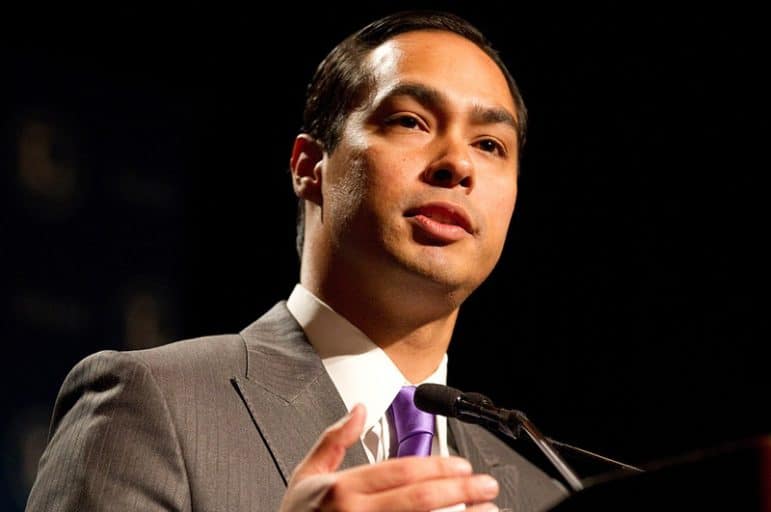
Bob Daemmrich / The Texas Tribune
U.S. Secretary of Housing and Urban Development Julián Castro
WASHINGTON — Only a year ago, Democrats far and wide treated U.S. Secretary of Housing and Urban Development Julián Castro as the most likely vice presidential pick for a Hillary Clinton ticket.
Young and Hispanic, the former San Antonio mayor posed a perfect complement to the former New York senator and Secretary of State.
But in recent weeks, speculation about Castro’s chances has grown more muted. The names of other contenders are being bandied about amid the most consuming question in Democratic politics right now: Whom might Clinton pick as her running mate?
Sources close to the Clinton campaign — who declined to be named because they aren’t authorized to speak on the record — say there are strong signs the formal process of vetting prospects has begun and that Castro is indeed on the short-list. A Clinton spokesperson declined to comment for this article.
But besides Castro, interviews with nearly three dozen Democratic consultants, operatives and elected officials revealed the names of several other possible contenders: U.S. Sens. Cory Booker of New Jersey, Sherrod Brown of Ohio, Tim Kaine of Virginia and Amy Klobuchar of Minnesota; Govs. John Hickenlooper of Colorado and Terry McAuliffe of Virginia; former Gov. Deval Patrick of Massachusetts; and U.S. Labor Secretary Tom Perez. U.S. Sen. Elizabeth Warren also surfaces in some of these conversations, identified as an option to placate the restive, anti-Clinton followers of presidential hopeful Bernie Sanders.
The vice presidential selection process is cloak-and-dagger on a scale unlike anything else in politics, and Clinton’s inner circle is successfully keeping even the smallest details secret. For one, she’s not yet the party nominee, though she’s closing in on presumptive status with her almost insurmountable delegate lead over Sanders, the Vermont senator.
If Clinton secures the nomination, she will likely weigh the political strengths of those on her short list against their ability to serve as president if the unthinkable occurs, said Ben LaBolt, who was a spokesman for both of President Obama’s presidential campaigns.
As for Castro, there is near-uniform agreement that he would bring unique strengths and weaknesses to a Clinton ticket.
Castro came to Washington almost two years ago, after President Obama nominated him to the Cabinet. Previously, he served for five years as San Antonio mayor. Ivy League-educated and attractive, Castro was first elevated to the national stage when Obama named him keynote speaker of the 2012 Democratic National Convention.
Castro, 41, also brings to the table one of the best surrogates in Democratic politics: his twin brother, U.S. Rep. Joaquin Castro of San Antonio. And he has advocates who wield influence in the Clinton sphere: former Texas Land Commissioner Garry Mauro and former San Antonio Mayor Henry Cisneros, who was Bill Clinton’s first appointee at HUD.
His fans say Julián Castro could motivate young people — many of whom have been emboldened by Sanders’ campaign — and Hispanics to the polls, helping Clinton recreate the coalition of millennials and minorities that sent Obama to the White House.
Furthermore, the future of Texas is on the minds of Democrats nationally. While they’re realistic about Texas’ current political state — it is a conservative behemoth on the map — its rapid Hispanic growth lends hope to many in the party that it could be a battleground state down the road.
The Castro brothers worked Texas hard during the Clinton campaign’s February sprint here. The state’s March primary win came at a crucial time for Clinton: Her Iowa victory had been narrow, and Sanders had wiped her out in New Hampshire.
“Certainly, Julián Castro and his brother can help make” Texas more competitive for Democrats, Dallas Democratic fundraiser Cappy McGarr said.
There could be drawbacks to Castro, too, including his experience and ambition.
Vice President Joe Biden’s 36 years in the Senate provided knowledge and relationships that aided the president legislatively. Castro, meanwhile, was only sworn into office 21 months ago and has faced growing pains in his Cabinet role, including some rocky Congressional hearings.
But Democrats argue not much has happened in the past year to diminish Castro’s odds. Instead, they say the speculation that he was a foregone vice presidential pick was premature.
With Donald Trump the presumptive GOP nominee, there will now be other political factors for Clinton to consider: whom Trump chooses as his running mate, which states his campaign targets, and whether his candidacy means Clinton must court white, blue-collar men in Rust Belt states over Latinos in the Southwest.
But the most important will likely be rapport. Stephanie Cutter, a senior aide at the center of both Obama and 2004 Democratic nominee John Kerry’s vice presidential vettings, argues interpersonal chemistry is key.
“Pressuring the nominee to pick a certain person from a certain region doesn’t help the process,” Cutter said. “… The most important criteria for the vice presidential pick is to have chemistry and a real partnership with the nominee, and voters can smell it when it’s not there.”
